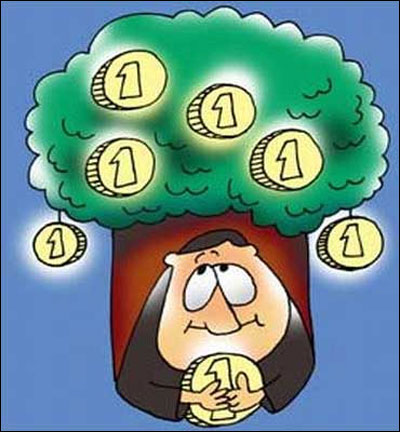Photographs: Illustration: Uttam Ghosh/Rediff BankBazaar.com
Empirically, the percentage of investments just before 3-6 months of tax filing climbs up while it becomes a bit subdued post the tax filing season. Why such a scenario? What is the relationship between tax filing and investment?
Many investors confuse investment with a tool to save tax and do not see them as a tool to build wealth!
Investment certainly helps you save taxes but by making tax saving as the primary goal of investment, you are mismanaging investments that can help you retire early in style!
Click on NEXT for more...
Why you should think beyond tax when investing!
Photographs: Illustration: Uttam Ghosh/Rediff
Tax saving versus investment
Tax saving is an integral part of financial planning no doubt. There are several schemes introduced by the government to encourage individual savings. It is meant to inspire people to see the larger picture and not just to try to save taxes for a particular year.
It is true that tax savings is equivalent to earning a return and is supported by the philosophy that a penny saved is a penny earned!
The problem arises when you do not see tax as a piece of the saving puzzle and consider it as the puzzle itself! Most individuals just opt for a random investment instrument to save tax without weighing its pros and cons and without understanding why it deserves to be a part of a healthy financial portfolio.
Every investment needs to have an objective. A person starting out on his first job could start investing with a goal to start his own business; a new parent might want to get started early to invest for his child's education; a senior executive may invest for his retirement savings corpus; an employee with the highest income bracket might want an additional tax benefit and invest in infra bonds solely for tax saving etc. Investment can also be of short term and long term.
Investment to save tax will fall into short term investment as the sole purpose is to save tax.
Click on NEXT for more...
Why you should think beyond tax when investing!
Photographs: Illustration: Uttam Ghosh/Rediff
Why should you think beyond tax?
A host of tax saving instruments might be introduced during the tax season for the masses but you must keep in mind that you need to carefully sift through them to choose an instrument that will suit your individual needs.
Here, individual needs refer to aspects that will drive investment keeping the larger objective of building wealth for the future in mind rather than a last minute rush to save tax! Investors should decide their investment plan based on two aspects: objective and investment horizon.
Investment Objective: The objective of any investment is to get specific returns or an approximate sum of money at the end of the investment horizon. The objective should be realistic and must take into account the risk appetite of the investor.
For example, if you are an investor with a low risk appetite you should not invest in stocks and should not expect 20% returns over the period. At the same time, a risk taking investor can build immense wealth by investing in equity and equity oriented mutual funds over a longer term.
Investment Horizon: As an investor you should consider your investment horizon while choosing investment assets. Risky assets such as equity and equity oriented mutual funds are not a good choice for short term investment. Their returns fluctuate drastically in the short term but tend to provide good returns over a longer time frame to the tune of 10-12 years.
Those who are interested in short term investments should look at debt assets such as company deposits, Government bonds, bank fixed deposit etc.
Similarly, if you wish to stay invested for a longer term, you should consider investing in equities and equity oriented mutual funds. Investing in debt will incur opportunity cost.
Click on NEXT for more...
Why you should think beyond tax when investing!
Photographs: Illustration: Uttam Ghosh/Rediff
Things to remember
Investment planning should be done in advance and you should not wait for the tax filing season to arrive. Investors often make the wrong choices in the last minute rush to save tax.
Remember that you do not save much in taxes anyway. Most of the investments fall under article 80C which provides a maximum tax deduction of 100,000. This amount is so small that your PPF alone can cover the entire 100,000 now, as the investment limit on it has been recently increased from 70,000 to 100,000.
Even otherwise your EPF and insurance will anyway cover most of it. Nevertheless, if you still need to invest, you should do it as the saving itself is equivalent to 30 per cent of returns immediately.
Infrastructure bond under 80CCF was re- introduced last year to help increase the tax savings and is useful solely for this purpose for most individuals who are intent on saving tax.
Click on NEXT for more...
Why you should think beyond tax when investing!
Photographs: Illustration: Uttam Ghosh/Rediff
Secondly, if you have not taken up any investment for tax savings, do not panic and buy anything that is recommended. Do your own research and take your time. If you find nothing, don't buy. It is better to pay taxes than lose out more than your tax liability in a bad investment. Some investors invest in properties just to save taxes.
This is fine if you have enough disposable income to pay the EMIs. However, if your disposable income is not enough to afford the EMI, avoid investing in properties.
Do remember that properties are not easily converted to cash because it takes time, due diligence, and enormous amount of paperwork to sell the property.
Additionally, investment planning requires expertise. The good news is that this expertise can be learnt provided you spend some effort and time in this direction.
Asking simple questions such as what is the past returns over last 10 years; what is the rating assigned to this bond; what is PE ratio etc., can go a long way in building wealth and mapping out a wise investment schedule.
A healthy financial portfolio is an ideal mix of short and long term investments or the right ratio of debt and equity instruments.
Finally, investment planning is a necessity to secure the future for yourself and your loved ones. Ensure you do not make it solely the function of tax saving alone!






article